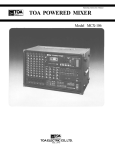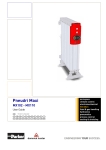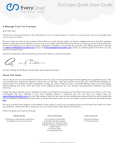Download Toshiba MX-104 Music Mixer User Manual
Transcript
Operating Instruction Manual TOA POWERED MIXER Model MX-104 TOA ELECTRIC CO., LTD. KOBE, JAPAN Contents General Description 2 Features 2 Front Panel [Names of components & their usage] 3 Rear Panel [Names of components & their usage] 4 Connection Examples 5 Input Connections 6 Block and Level Diagrams 7 Specifications 8 Characteristics Diagrams 9 Appearance 9 Precautions 1. XLR Type Audio Connector The connectors are wired as follows. The pin 1 is ground [shield), the pin 2 cold (low, minus), the pin 3 hot (high, plus). 2. Description of components and functions on the MX-104. Various descriptions are applied, depending on each manufacturer. In our Operating and Instruction Manual explanation of components and functions is made according to our usage for them. — 1 — General Description The TOA MX-104 is a very compact, four channel self-powered mixer. It was designed to deliver maximum features and performance in a cost-effective portable PA package. The MX-104 features four input channels, one program output, and one Foldback output. The internal amplifier is rated at 100 watts into an 8 ohm load, and 150 watts into 4 ohms. Each input channel has an electronically balanced XLR connector, and a highimpedance unbalanced 1/4" phone jack. In addition, each channel features two-band EQ, a pre-EQ Foldback send, and post-EQ reverb send. The master control section features a patchable 5-band graphic equalizer, a quality 3spring reverb, a full patch bay with 1/4" phone auxiliary and RCA tape inputs, and master volume controls for Program, Foldback, and Reverb return to both. The power amp protection circuitry and autocomp compressor, both with LED's, are also located in this section. Features 1. Four input channels 2. 100 watts into 8 ohms, 150 watts into 4 ohms 3. Patchable 5-band graphic EQ 4. Auto Comp compression unit w/LED 5. Built-in spring reverb 6. Power amp protection circuitry w/LED 7. Full patch bay 8. Aux input w/level control, RCA jacks and parallel phone 1/4" jacks. 9. Reverb level to PGM and FB 10. Independent Foldback mix. Each Channel 1. Input level control 2. Two band EQ 3. Pre-EQ Foldback send 4. Post-EQ Reverb send 5. Low-Z electronically balanced XLR input 6. Hi-Z unbalanced 1/4" input —2— Front Panel High Equalizer Control (HIGH) The high EQ control alters the high frequency response of the input channel, providing ±13dB at 10kHz, and ±15dB at 20kHz of continuously variable active shelving equalization. The "0" detented position provides flat audio response. Low Equalizer Control (LOW) The low EQ control provides ±13dB at 100Hz and ±15dB at 50Hz of continuously variable active shelving equalization. The "0" detented position provides flat audio response. Input Level Control (LEVEL) The level control provides continuously variable adjustment of the channel output to the program mixing buss, thus determining the level of that channel in the main sound system mix. Since the reverb signal is "post" this control, an increase in the level of the channel's output will also result in a corresponding increase in the reverb effect of that channel. The nominal level of the input level control is at the "10" position. High Impedance Connectors (HIGH Z) These connectors are unbalanced, standard 1/4" phone jacks with an input impedance of 27k ohms, and an input level of -35dB. When a plug is inserted into the high - Z input, the corresponding XLR connector is automatically switched out of the input circuitry. Low Impedance Connectors (LOW Z) The XLR connectors are low impedance, electronically balanced inputs with an input impedance of 1k ohms. Graphic Equalizer (EQUALIZATION) The graphic equalizer is 5 independent active bands ( f i l t e r s ) , providing 12dB of boost or cut at each center frequency. The "0" detented position provides f l a t audio response. Reverb to Foldback Control (REV TO FB) This control adjusts the amount of reverb signal that is returned to the foldback buss and thus the level of reverb contained in the on-stage monitor mix. Reverb/Control (REV) This control determines the level of signal assigned to the reverb mixing buss. Rotating the control clockwise increases the amount of reverb in that channel. Foldback Master Control (FB) The FB master control adjusts the overall combined signal level of the four independent channel foldback sends, and thus the level of the entire on-stage monitor mix. Foldback Control (FB) The Foldback control determines the level of signal assigned to the foldback mixing buss, thus setting the level of that channel in the on-stage monitor mix. Aux Level Control (AUX) This control sets the overall level of the Aux input signal. Power Amp Compression Indicator (COMP) The Comp LED lights when the internal compressor is activated. The compressor is provided to protect speaker systems by compressing the input signal level of the power amplifier when clipping occurs in the output stage. Frequent flashing of the LED is not reason for alarm. However, a constant or steady light indicates that the MX-104 is being overdriven and that the internal power amplifier is possibly "under powered" for that application. The output level of the MX104 should be decreased until the LED only flashes intermittently. Power Indicator LED (POWER) The indicator LED lights when the power switch is "on". Reverb to Program Contro1 (REV TO PGM) This control adjusts the amount of reverb signal that is returned to the program buss and thus the level of reverb contained in the main sound system. Graphic Equalizer Input Jack (GEQ IN) The GEQ i n p u t jack allows t h e graphic equalizer to be used ind e p e n d e n t l y of t h e MX-104 w i t h other external e q u i p m e n t , or t h e i n t e r n a l power amplifier and the graphic equalizer w i t h e x t e r n a l e q u i p m e n t . When a plug is inserted, the main mix from t h e program buss is disconnected from the graphic equalizer and the power a m p l i f i e r . The nominal input level is +4dB w i t h an i n p u t impedance of 50k ohms. Power Amp Protection Indicator (PROTECT) The indicator LED lights if the power amplifier output is shorted, if the temperature of the unit rises above acceptable levels, or if DC is drifted to the speaker outputs. If the LED should light, speaker wiring and ambient temperature of the MX-104 should be checked. If the LED remains lighted, the unit should be referred to qualified service personnel for repair. Note: The MX-104 protection circuitry will (1) detect 'faulty conditions' within the power amplifier, (2) give a visual indication, and (3) automatically shut down until the f a u l t condition is alleviated. This special circuitry ensures maximum reliability and virtually eliminates equipment damage due to unsafe or fault conditions. Please refer to fault p r o t e c t i o n table on page 4 for f u l l explanation of this important feature. Graphic Equalizer Output Jack (GEQ OUT) This j a c k allows t h e MX-104 and t h e i n t e r n a l g r a p h i c e q u a l izer to be used w i t h an e x t e r n a l power a m p l i f i e r , or in c o n j u n c t i o n w i t h t h e GEQ in j a c k , to be used i n d e p e n d e n t l y of all o t h e r MX-104 c i r c u i t r y . N o m i n a l o u t p u t level is +4dB w i t h an i m p e d a n c e of 600 ohms. Power Amplifier Input Jack (PWR IN) The PWR Amp i n p u t jack allows the i n t e r n a l power amplifier to be used w i t h e x t e r n a l equipment. When a plug is inserted, t h e power amp is a u t o m a t i c a l l y disconnected from the MX-104 m i x e r section. The nominal inp u t level is +4dB w i t h an i n p u t i m p e d a n c e of 10k ohms. Program Output Jack (PGM OUT) The PGM Out jack is provided for connection to external equalizers and/or power amps, deriving its signal prior to the internal GEQ and power amp. Nominal o u t p u t level is +4dB with an impedance of 600 ohms. Program Master Control (PGM) The PGM control adjusts the overall combined signal level of the four independent channel level controls, and thus the level of the main sound system. Aux Input Jacks (AUX IN) The phone jack and RCA pin jacks are wired in parallel, with an input level of -20dB. When a plug is inserted into the phone jack, the RCA pin jacks are automatically switched out of the AUX circuitry. Foldback Output Jack (FB OUT) This jack is for connection to external power amplifiers and/ or equalizers for the on-stage monitoring system. Nominal o u t p u t level is +4dB w i t h an impedance of 600 ohms. If the internal power amp and equalizer are to be used for the onstage monitor system, the FB o u t p u t should be connected to the GEQ input jack. —3— Rear Panel Power Switch (POWER) The power switch is a threeposition type with the middle position being the "off position. The MX-104 should be operated in the switch position which produces the lowest amount of system hum. Cord Wrap The cord wrap is provided for convenient storage of the power cord when the MX-104 is not in use. Caution - The power cord should always be completely removed from the cord wrap prior to operation of the unit. This will insure maximum cooling of the MX-104. For the same reason, adequate clearance should be maintained between the rear panel and any other surface (4-6 inches should do). The vents on the bottom and top of the MX104 are also provided for convection cooling. These vents should be kept clear and open. Failure to do so may cause thermal shutdown of the unit. Speaker Jacks (SPEAKERS) The speaker outputs are standard 1/4" phone jacks wired in parallel. Speaker cables (recommend at least #18 gauge wire) should be connected between the MX-104 and the speaker systems prior to applying power to the unit. Caution - The MX-104 should never be operated into less than a 4 ohm speaker load. Earth Terminal (GND) AC Power Cord The power cord is the three-wire type with proper grounding facilities. Caution - The ground pin should not be removed under any circumstances. If the MX-104 must be used without proper grounding facilities, a suitable grounding adapter should be utilized. Warning - To avoid possible equipment damage and/or personnel injury, the fuse should always be replaced with same type and rating. Using improper fuses will also void the warranty. The MX-104 should always be disconnected from AC outlet prior to changing fuses. If fuse repeatedly fails, the unit should be referred to qualified service personnel for repair. Operation of the MX-104 with proper grounding techniques will result in less system noise and greatly reduced shock hazard. Fault Protection Table Fault Protection Indication Action Restoration Excessive current due to overloads. Current limiter activates at less than 2 ohm. Compressor LED illuminates. Remove excessive loads. Minimum speaker loads 4 ohm. Automatic restoration after normal loads are obtained. Short circuits (less than 0.4-ohm) Current limiter activates, input signal is lowered, unit shuts down, Amp protection LED illuminates. Check speaker lines/systems for shorts. Turn off power switch. Turn on into operational loads. Temperature rise of heat sink (more than 105°C) Input signal is lowered. Unit shuts down. Amp protection LED illuminates. Check for adequate ventilation. Automatic restoration after temperature lowers (to 75° - 95° C) DC drift Input signal is lowered. Unit shuts down. Amp protection LED illuminates. Refer to qualified service personnel. Automatic restoration after normal bias is regained. —4— Connection Examples SPEAKER SYSTEM for foldback MAIN SPEAKER SYSTEM (Self powered speakers TOA model SM-25A) From Speaker jack on Rear Panel KEYBOARD Low Z input should be connected with low impedance (50 ohm ~ 600 ohm) microphones CASSETTE TAPE DECK for playback MUSICAL INSTRUMENT — 5 — Input Connections Generally speaking, there are two rules to follow when connecting equipment outputs to the inputs of other equipment. 1. Properly match the impedances of the outputs and inputs. 2. Connect low impedance outputs to high impedance inputs. It goes without saying that not only input and output impedance matching, but also level matching should be taken into consideration. Each input channel of the MX-104 is provided with an Input Level Control that includes a negative feedback (NF) circuitry, so the usable signal level range is wide. Input impedances and levels are shown in the following table. INPUT SPECIFICATIONS FOR USE WITH NOMINAL SENSITIVITY* (PGM OUTPUT LEVEL +4dB) CONNECTOR MICROPHONES -60dB (0.78mV) XLR TYPE NC3F LOWER IMP LINES -35dB (13.8m V) PHONE JACK AUX LOWER IMP, LINES -20dB (77.5mV) RCA PIN JACK PHONE JACK GEQ LOWER IMP, LINES +4dB (1.23V) PHONE JACK PWR/AMP LOWER IMP, LINES +4dB (1.23V) PHONE JACK CONNECTION INPUT ACTUAL LOAD IMPEDANCE CH1 LOW Z OPEN CH4 HIGH Z *Sensitivity is the level required to produce a program out level of +4dB. *0dB is referenced to 0.775V RMS. All XLR Type connectors are electronic balanced. Phone jack is unbalanced. If the line going from one piece of equipment to another is long (more than 5m), we recommend that balanced outputs be connected to balanced inputs. As is described in the beginning of the Operating Instructions Manual, the connectors of the MX-104 are wired as follows: Pin 1 is ground (shield). Pin 2 is cold (low, minus). Pin 3 is hot (high, plus). —6— Block and Level Diagrams BLOCK DIAGRAMS LEVEL DIAGRAM —7— Specifications MIXER SECTION Maximum Voltage Gain INPUT to PGM out INPUT to FB out INPUT to GEQ out AUX to PGM out Frequency Response +0, -3dB 60Hz~20kHz (input LEVEL at "5" position) Total Harmonic Distortion 0.05% +4dB* at 1kHz. 64dB 64dB 64dB 24dB Input EQ 50Hz ±15dB Shelving 20kHz ±15dB Shelving Hum and Noise (Open) Equivalent Input Noise -130dB* (20Hz ~ 20kHz) Equivalent Input Noise -133dB* (IHF A) All level Controls Minimum -110dB* (IHF A) PGM Master at MAX and all input level controls minimum -90dB* (IHF A) PGM Master at MAX and one input level control at MAX -70dB* (IHF A) Equalization 63Hz ±12dB Peaking 250kHz ±12dB Peaking 1kHz ±12dB Peaking 2kHz ±12dB Peaking 8kHz ±12dB Peaking INPUT SPECIFICATIONS FOR USE WITH NOMINAL SENSITIVITY* (PGM OUTPUT LEVEL +4dB) CONNECTOR MICROPHONES -60dB(0.78mV) XLR TYPE NC3F LOWER IMP LINES -35dB (13.8m V) PHONE JACK AUX LOWER IMP, LINES -20dB (77.5mV) RCA PIN JACK PHONE JACK GEQ LOWER IMP, LINES +4dB (1.23V) PHONE JACK PWR/AMP LOWER IMP, LINES +4dB (1.23V) PHONE JACK CONNECTION INPUT ACTUAL LOAD IMPEDANCE CH1 LOW Z OPEN CH4 HIGH Z OUTPUT SPECIFICATIONS CONNECTION ACTUAL SOURCE IMPEDANCE FOR USE WITH NOMINAL NOMINAL OUTPUT LEVEL* MAX. BEFORE CLIP CONNECTOR PGM +4dB [1.23V] +20dB (7.75V) PHONE JACK GEQ +4dB (1.23V) +20dB (7.75V) PHONE JACK FB +4dB (1.23V) +20dB (7.75V) PHONE JACK POWER AMPLIFIER SECTION Frequency Response +0, -1dB 15Hz to 30kHz (150W RMS Rated Power & Load 150W RMS HOW RMS Power Output at Clipping 1% THD, 1kHz 160W RMS 115W RMS Total Harmonic Distortion Less t h a n 0.1% (200mW ~ 150W RMS, 20Hz~20kHz, 4 Typically below 0.05% Compresser Dynamic Range Greater t h a n 26dB Hum and Noise At least 105dB S/N ratio, 20H/~20kHz At least 109dB S/N r a t i o IHF-A weighted Damping Factor Greater t h a n 200 Input Sensitivity +4dB* (1.23V) Input Impedance Output Connector Phone Jack x 2 Power Requirement 294 W 120V AC 60Hz Dimensions 494(W) X 184(H) X 304(D) (19.44 X 7.24 X 11.97) ins. Weight 10 kg (22 l b s ) *0dB is referenced to 0.775V RMS. * Specifications are subject to change without notice. —8— Characteristics Diagrams LOW Z HIGH Z IN & INPUT EQ (LEVEL Control) HIGH Z IN. & INPUT EQ (se t at "5") GEQ POWER AMP POWER BAND WIDTH POWER AM P T.H.D. vs POWER OUTPUT POWER AM P COMPRESSOR REVERBERATION FREQUENCY RESPONSE Appearance —9— TOA ELECTRIC CO., LTD. KOBE, JAPAN Printed in Japan 133-02-690-80



















